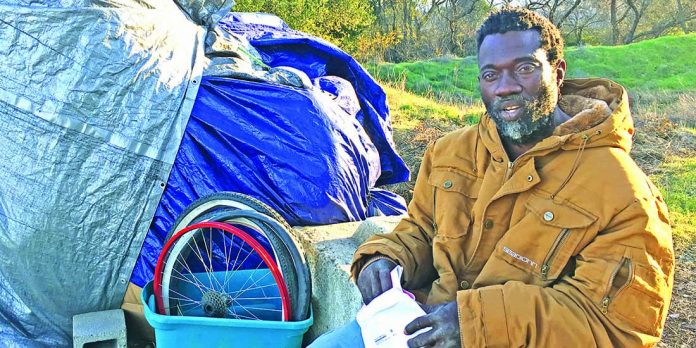
A month after rape suspect Sharwian Bobian was released from jail, law enforcement officers are searching for him. He is accused of false imprisonment and involuntary sex with a woman who brought food and provisions to his makeshift shelter.
The Santa Clara County District Attorney’s Office initially declined to pursue criminal charges because they believed the case would be difficult to prosecute. On Monday, they reversed course and filed court papers to proceed against Bobian, a 43-year-old homeless and mentally ill man who left his encampment near the San Martin Transfer waste processing facility following his Jan. 4 release and a brief psychiatric hold.
As of 8pm Tuesday, Feb. 5, his whereabouts remained unknown.
The Sheriff’s Office investigated the Jan. 2 incident and detained Bobian that night after interviewing the victim and taking her to Valley Medical Center in San Jose for an hours-long rape kit examination, according to records that became public earlier this week along with the charging documents.
Sheriff’s deputies had expected the case to move forward in early January, however Clarissa Hamilton of the DA’s sexual assaults team reportedly called the victim the morning after the alleged rape to tell her that the office opted against pressing charges. According to the victim, prosecutors cited a legal doctrine called the Mayberry Defense, saying Bobian might have interpreted the victim’s lack of apparent resistance as consent.
Prosecutors changed their minds this week and obtained the warrant to arrest Bobian. The South Carolina transplant has a two-decade criminal history that includes aggravated assault in Georgia and a host of petty crimes in Santa Clara, Santa Barbara and San Mateo counties in California.
The San Martin incident rocked the small community, where neighbors shared the victim’s sense of violation and questioned why the DA allowed the suspect to walk free less than a day after officers brought him to jail.
Though the victim, described in court papers as Jane Doe, maintains she was told the morning of Jan. 3 not to expect prosecution, DA spokesman Sean Webby said the case never closed—it was just under scrupulous, time-intensive review.
“We’ve been investigating it the entire time,” Webby said in a Feb. 1 phone call.
Most reported rapes go unprosecuted. Nationwide, on average, just 13 of every 1,000 reported rapes get referred to prosecutors, according to data from the U.S. Department of Justice, and about seven of those result in felony convictions. Last year, law enforcement agencies in Santa Clara County submitted a combined 994 sexual assault cases to the district attorney’s office, which filed charges in about half of them. Of those, just 34 went to jury trial and 25 resulted in convictions.
Prosecutors have the unenviable task of deciding whether a claim meets the American Bar Association’s ethical standards for criminal charges: that there’s probable cause of an offense and enough evidence to support a conviction.
The victim and her husband said the DA’s reluctance to charge Bobian because an attorney might claim a mistake-of-fact defense suggests more concern for conviction rates than public safety.
California law deems rape an act accomplished against a victim’s will “by means of force, violence, duress, menace or fear of immediate and unlawful bodily injury.” Lack of consent being the defining element. Though the expectation of victim resistance has been largely eliminated through legislative reforms, it’s still effectively enforced through case law.
“It just feels so disgusting and disheartening,” the victim said in a recent interview. “The criminal system let us down so horrifically.”
The couple also took issue with the way prosecutors kept them in the dark on important details, telling them Bobian had no criminal history while his rap sheet includes aggravated assault and evading police convictions in Atlanta, Georgia. The other brushes with the law were mostly petty crimes symptomatic of homelessness and mental illness, like trespassing, shopping cart theft and throwing an object at a moving car. Bobian is currently on probation for the San Mateo offenses, according to court documents.
The accuser criticized the DA’s handling of the case as indecisive and concerned more about the defendant than the crime victim.
The prosecutor’s reversal follows a month of media interest in the case and outrage expressed privately in the law enforcement community, along with the victim’s willingness to share painful details in multiple interviews about the incident with a man she tried to help out of compassion for his miserable situation.
“I can’t understand how this could happen in an age of women’s rights and equality,” she said. “I’m still trying to process the rape, and all those feelings that go with it, and now I feel like I have to go into fight mode.”







